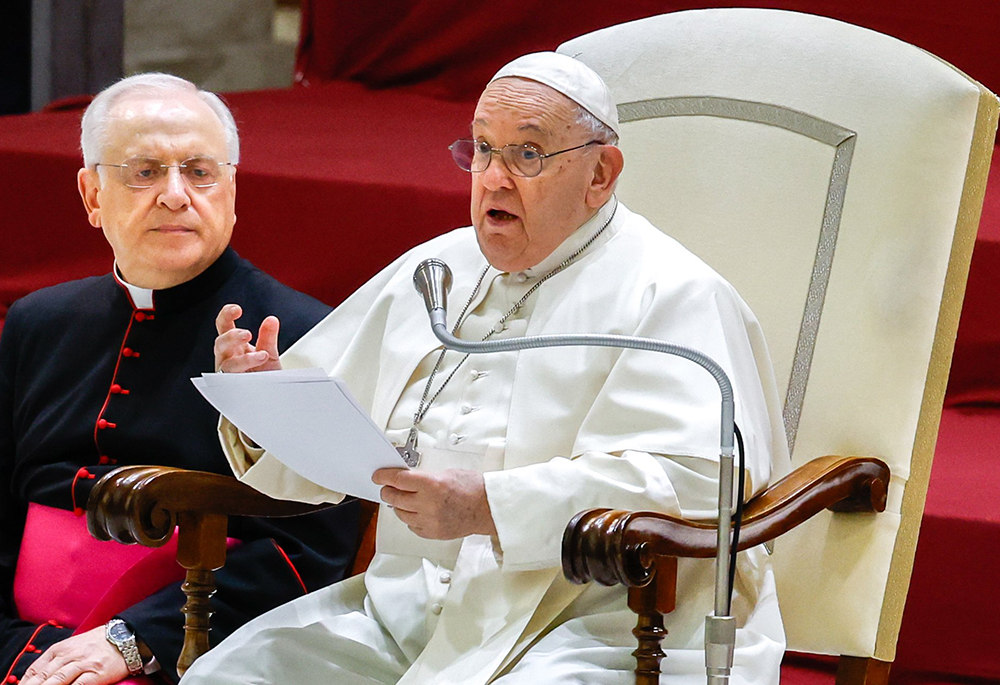
Pope Francis speaks to visitors during his general audience in the Paul VI Audience Hall at the Vatican Dec. 13. (CNS/Lola Gomez)
This October, all eyes turned to Rome as Pope Francis opened the highly anticipated synod on synodality, where some 450 delegates discussed the most pressing issues in the Catholic Church.
But Francis' success at launching the synod, a centerpiece of his papacy, is not the only headlines he made this year, as the top 10 most read stories for 2023 on NCR's website reveal. The 87-year-old pope also removed controversial prelates from their positions, spoke strongly against his critics, named new cardinals and strengthened his stance on welcoming LGBTQ Catholics into the church.
These were NCR's most read — not necessarily the most important — news stories of the year. They are listed in order by the number of website visitors who read the story, with short summaries of their contents. We'll post a separate article about our most read opinion and commentary pieces later this week.
Pope Francis meets with about 90 Jesuits at their St. John de Brito College Aug. 5 in Lisbon, Portugal. (CNS/Vatican Media)
1. Pope Francis blasts reactionary American Catholics who oppose church reform
While meeting with Jesuits Aug. 5 during his visit to Lisbon, Portugal, for World Youth Day, Pope Francis blasted what he described as groups of "very strong, reactionary" American Catholics, warning against becoming "backwardists" who oppose change in the Catholic Church.
The pope was responding to a question from a Portuguese Jesuit who said he had spent last year in the United States — where he often witnessed criticisms of Francis' leadership of the church, including by American bishops.
"The situation in the United States is not easy: There is a very strong, reactionary attitude. It is organized and shapes the way people belong, even emotionally," said Francis. "I want to remind these people that backwardism is useless, and it is necessary to understand that there is a correct evolution in the understanding of questions of faith and morals."
Since the beginning of this pontificate, much of the resistance to the Francis papacy has thrived in the English-speaking world, particularly in the United States, where many of its leaders have openly opposed the pope's pastoral priorities, especially when it comes to welcoming LGBTQ people and other minorities into the church and combating climate change.
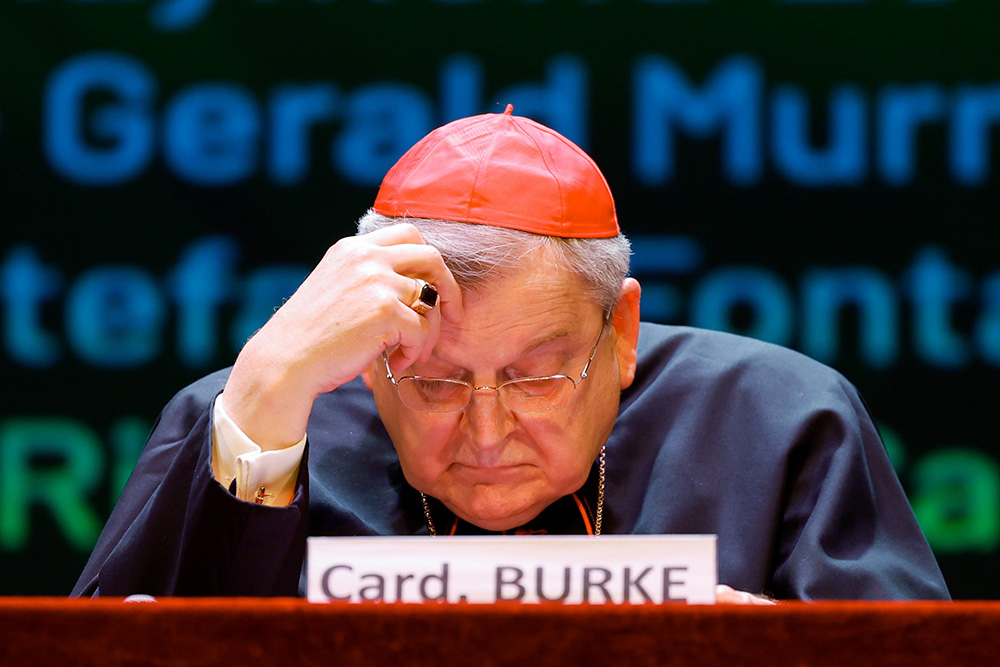
U.S. Cardinal Raymond Burke follows the written text of another speaker at the conference "The Synodal Babel" at the Ghione Theater in Rome Oct. 3. (CNS/Lola Gomez)
2. Pope Francis to remove Cardinal Burke's Vatican apartment and salary, sources say
In late November, Pope Francis punished one of his highest-ranking critics, Cardinal Raymond Burke, by yanking his right to a subsidized Vatican apartment and salary.
Francis told a meeting of the heads of Vatican offices that he was moving against Burke, because he was a source of "disunity" in the church, said one of the participants at the Nov. 20 meeting. The participant spoke on condition of anonymity because he was not authorized to reveal the contents of the encounter.
Francis said he was removing Burke's privileges of having a subsidized Vatican apartment and salary as a retired cardinal because he was using the privileges against the church, said another person who was subsequently briefed on the pope's measures.
Burke, a 75-year-old canon lawyer whom Francis had fired as the Vatican's high court justice in 2014, has become one of the most outspoken critics of the pope, his outreach to LGBTQ+ Catholics and his reform project to make the church more responsive to the needs of ordinary faithful.
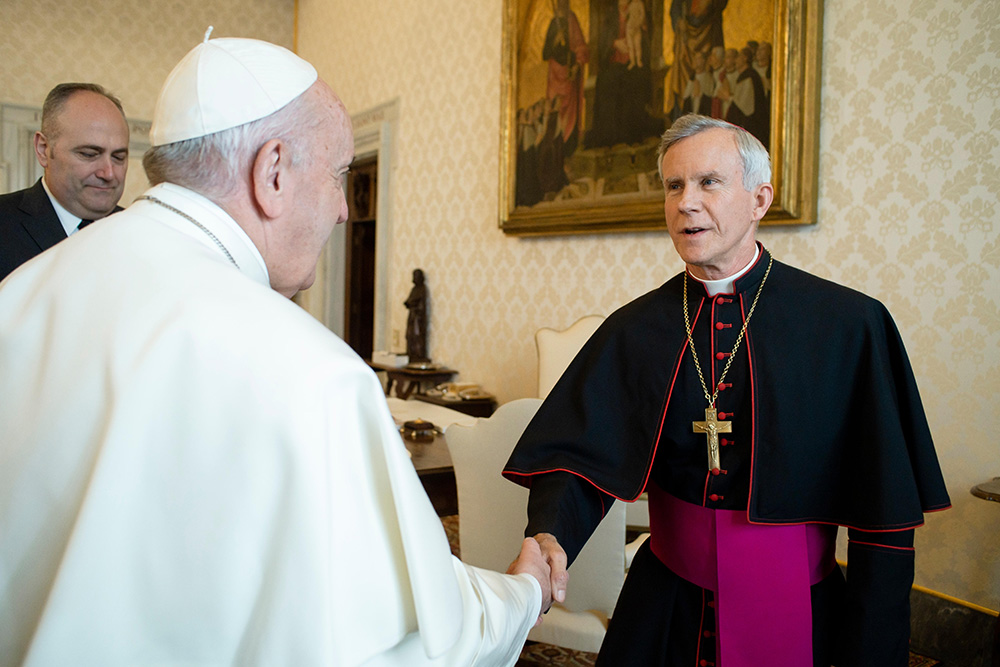
Pope Francis greets Bishop Joseph Strickland of Tyler, Texas, during a meeting with U.S. bishops from Arkansas, Oklahoma and Texas during their "ad limina" visits to the Vatican Jan. 20, 2020. (CNS/Vatican Media)
3. Bishop Strickland says he will not resign if pope asks. What comes next?
In September, we published a story from NCR staff reporter Brian Fraga about firebrand Texas Bishop Joseph Strickland, who has been subject to a Vatican investigation over his leadership style and right-wing comments on social media. Strickland had vowed not to resign or "voluntarily abandon" his diocese, even if Francis asked him to do so.
Francis effectively fired Strickland anyway on Nov. 11, which was announced in a short note in the daily press bulletin. The Vatican said Strickland, who had served as the leader of the Diocese of Tyler, Texas, since 2012, had been "relieved" of his post by Francis. That language, not typical in Vatican diplomatic speak, appeared to indicate that Strickland, age 65, had refused requests to resign.
Francis appointed Austin Bishop Joe Vásquez as apostolic administrator of the Tyler Diocese, entrusting him to lead until a new bishop is appointed.
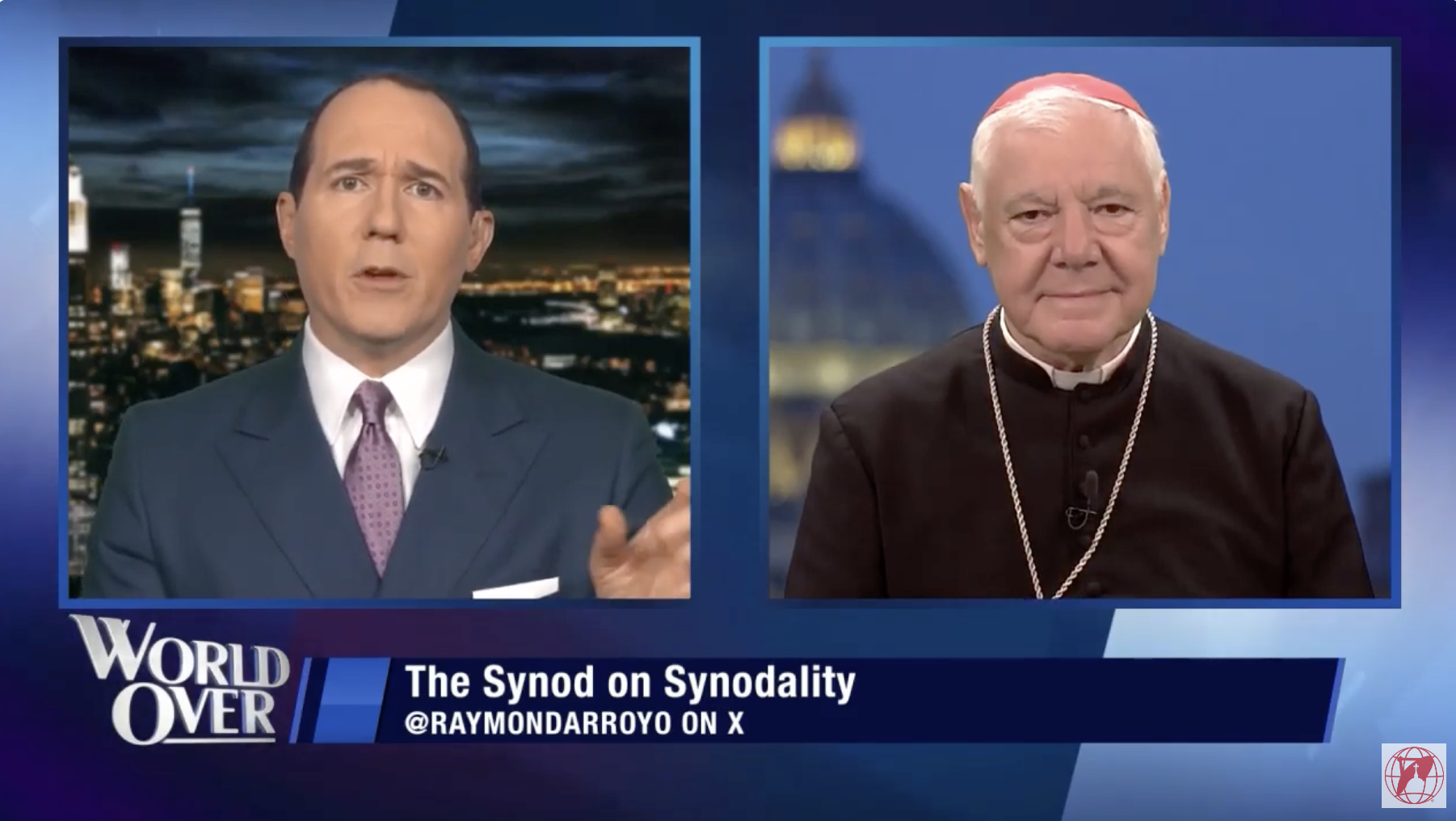
German Cardinal Gerhard Müller appears on Eternal Word Television Network's "The World Over" with host Raymond Arroyo during an Oct. 5, 2023, broadcast. (NCR screenshot/YouTube/EWTN)
4. German Cardinal Müller defies pope's request for confidentiality at synod with EWTN interview
German Cardinal Gerhard Müller, who led the Vatican's powerful Congregation for the Doctrine of the Faith 2012-17, defied the pontiff's request that members of the October synod summit maintain confidentiality about its proceedings.
Müller appeared Oct. 5 on the Eternal Word Television Network's nightly news program.
Müller, who previously voiced criticism of Francis' synod on the future of the church, expressed optimism about the start of the high-stakes summit, which is formally known as a Synod of Bishops and is taking place Oct. 4-29.
"I have … a certain form of optimism, but at the end we must wait in what direction it will go and what will be the decisions behind the scenery. That is always the problem," said Müller, describing the conversations at his table for the synod as "very good."
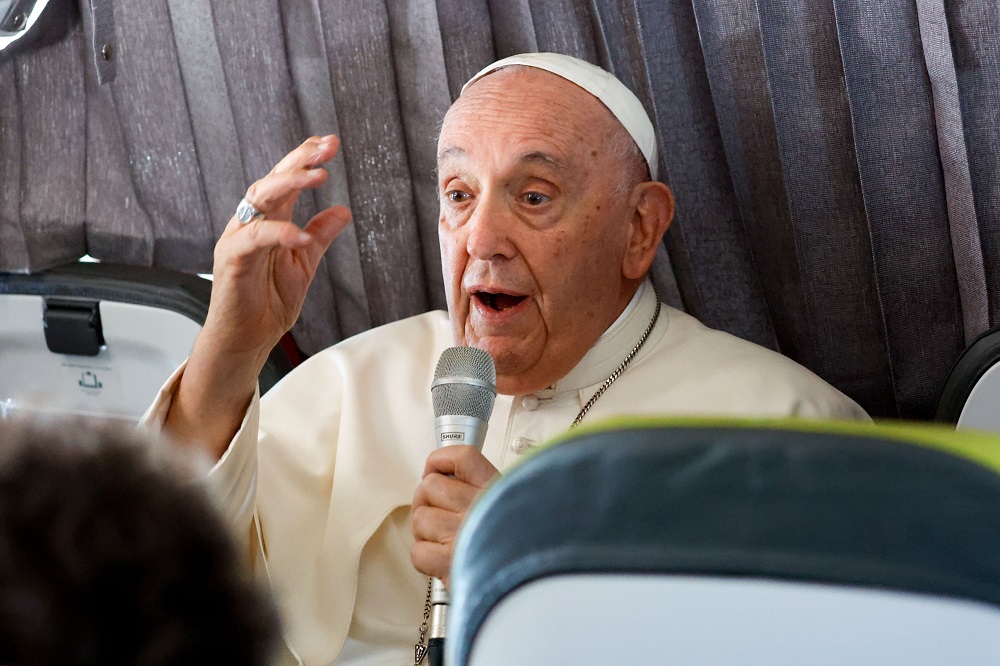
Pope Francis answers questions from journalists aboard his flight back to Rome from Lisbon, Portugal, Aug. 6, after his participation in World Youth Day. (CNS/Lola Gomez)
5. Pope doubles down on message that church is open to all, including LGBTQ people and women
After driving home a message to young people for several days in a row that the church is open to everyone, Pope Francis on Aug. 6 reiterated that such a message includes LGBTQ people and all marginalized groups.
"The Lord is clear," the pope said in reflecting on who is welcome in the church: "The sick, the elderly, the young, old, ugly, beautiful, good and bad."
The pope's remarks came during a 25-minute, in-flight press conference returning to Rome after a five-day trip to Portugal for World Youth Day, where the pope continued to repeat the message that everyone is welcome in the Catholic Church — at one point getting young people to repeat after him "todos, todos, todos" ("everyone, everyone, everyone").
Advertisement
6. Cardinal Mario Grech: Central figure in pope's plan to change Catholic Church
In late September, NCR Vatican correspondent Christopher White profiled Cardinal Mario Grech of Malta, who stood at the center of the pope's plan to change the global Catholic Church.
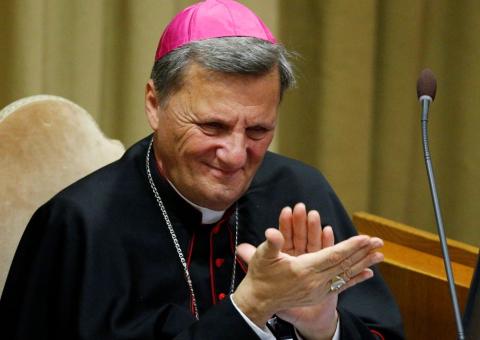
Then-Bishop Mario Grech of Gozo, Malta, applauds at the start of the first session of the Synod of Bishops for the Amazon at the Vatican Oct. 7, 2019. Pope Francis appointed him as secretary-general of the Synod of Bishops in 2020. (CNS/Paul Haring)
In 2019, the Vatican announced that Grech had been named as secretary general of the Synod of Bishops, effectively serving as Pope Francis' point person to not just organize and oversee synod meetings that take place in Rome every couple years on a particular theme — but to put synodality at the heart of the reforms taking place in the Francis papacy.
Asked about the weight of this responsibility, Grech was quick to deflect attention, insisting that he is not the protagonist of the synodal journey.
"My job — our job — is to listen to what the Holy Spirit is trying to communicate to the church through everybody," he told NCR in a 90-minute interview in his office in the spring. "Our call is to ask the Holy Spirit to help us discover how the people of God can work together."
Cardinals and bishops process to the altar to concelebrate with Pope Francis the opening Mass of the assembly of the Synod of Bishops in St. Peter’s Square at the Vatican Oct. 4. (CNS/Lola Gomez)
7. Opening momentous Vatican summit, Pope Francis begs church to 'not impose burdens'
Officially opening the monthlong Synod of Bishops on Oct. 4, Pope Francis encouraged the participants, bishops and laypeople alike, to reject the temptations of doctrinal rigidity and to embrace a vision of the church that is open and welcoming to all.
"The blessing and welcoming gaze of Jesus prevents us from falling into some dangerous temptations: of being a rigid church, which arms itself against the world and looks backward; of being a lukewarm church, which surrenders to the fashions of the world; of being a tired church, turned in on itself," Francis said in a homily in St. Peter's Square.
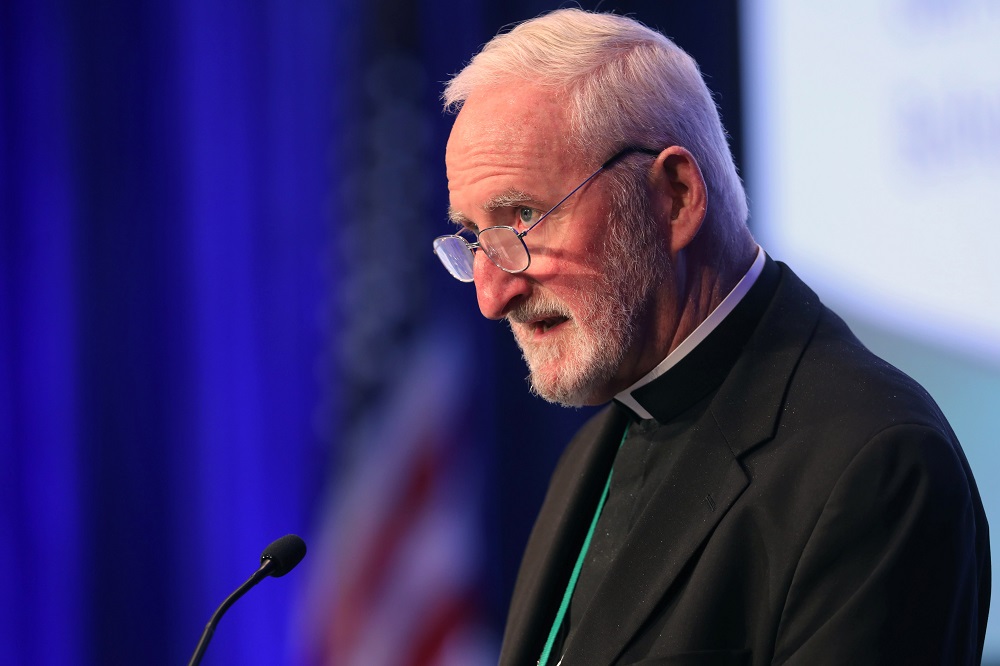
Los Angeles Auxiliary Bishop David G. O'Connell is pictured during a Nov. 17, 2021, session of the fall general assembly of the U.S. Conference of Catholic Bishops in Baltimore. According to local news reports, he was fatally shot Feb. 18, 2023. (Bob Roller/OSV News)
8. L.A.'s 'peacemaker' Bishop David O'Connell dead at 69
Los Angeles Auxiliary Bishop David O'Connell, a native of Ireland who spent most of his four decades as a priest ministering in L.A.'s inner city, died Feb. 18. He was 69.
According to local news reports, O'Connell was fatally shot. Local news reports said Los Angeles County sheriffs arrived at 1 p.m. to the bishop's home and found him dead of a gunshot wound to his upper torso.
"Bishop Dave," as he was known, was episcopal vicar for the archdiocese's San Gabriel Pastoral Region since 2015, when Francis named him an auxiliary bishop.
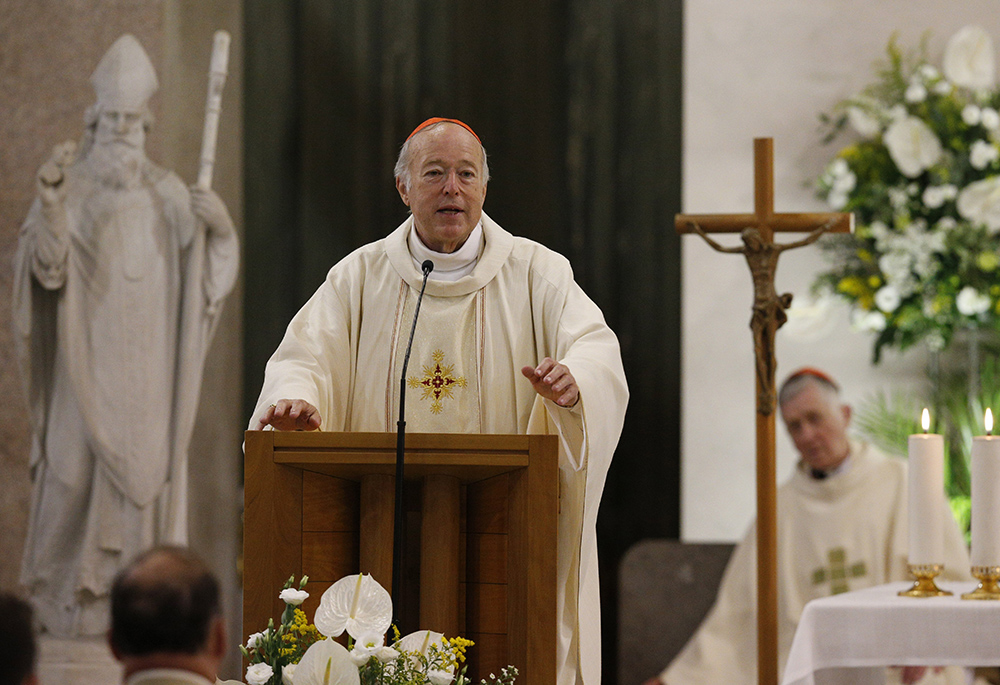
Cardinal Robert McElroy of San Diego gives the homily as he celebrates a Mass of thanksgiving at St. Patrick's Church in Rome in this Aug. 28, 2022, file photo. (CNS/Paul Haring)
9. Cardinal McElroy criticizes EWTN, says San Diego Diocese won't publish content
San Diego Cardinal Robert McElroy sharply criticized the Eternal Word Television Network, the conservative Catholic U.S. media conglomerate, in an interview with Spanish magazine Vida Nueva published on March 24.
Vida Nueva asked McElroy about the decision of newly installed Bishop Fernando Prado of San Sebastián, Spain, to ban diocesan television from carrying content produced by EWTN. Prado wrote that he made the decision "trying to support the communion of the diocese with the Successor of Peter."
"I would not have EWTN on diocesan media either," McElroy responded.
"EWTN worries me because it represents a giant of economic and cultural power connected to a religious viewpoint that is fundamentally critical of the pope," the cardinal said.
Prelates about to be made cardinals by Pope Francis wait at the beginning of the consistory in St. Peter's Square at the Vatican Sept. 30. (CNS/Lola Gomez)
10. Pope Francis names 21 new cardinals, including Vatican's ambassador to US
Francis on July 9 named 21 new cardinals, including the Vatican's ambassador to the U.S., Archbishop Christophe Pierre; American-born Archbishop Robert Prevost, who oversees the appointments of Catholic bishops worldwide; and the new head of the Vatican's doctrinal office, Archbishop Victor Manuel Fernández.
The pope made the announcement at the end of his weekly Sunday Angelus prayer from a window in the Apostolic Palace overlooking St. Peter's Square. Francis installed the new cardinals during a consistory at the Vatican on Sept. 30, saying these new cardinals represent the universality of the global church and the "inseparable link" between the pope and dioceses around the world.
Of the 21 new cardinals, 18 are under the age of 80 and would be eligible to vote in a papal conclave. As of Sept. 30, with the new additions, the total number of eligible cardinal electors is 137.
Bonus story: In major doctrinal shift, Vatican officially OKs Catholic blessings for gay couples
On Dec. 18, in a major doctrinal shift, the Vatican officially declared it possible for Catholic priests to bless same-sex unions and divorced and remarried couples. The pastoral shift may be among the most significant in the church's history.
While extremely narrow in scope, the Dec. 18 "declaration" from the powerful Dicastery for the Doctrine of the Faith may serve as the most concrete pastoral shift on the church's stance toward gay couples in the church's centuries' long history.
The publication of the eight-page document, "Fiducia supplicans: on the pastoral meaning of blessings," comes less than three months after Francis had personally opened the door to such a possibility in response to five retired conservative Catholic cardinals who had written to the pontiff about whether such blessings might be possible.







